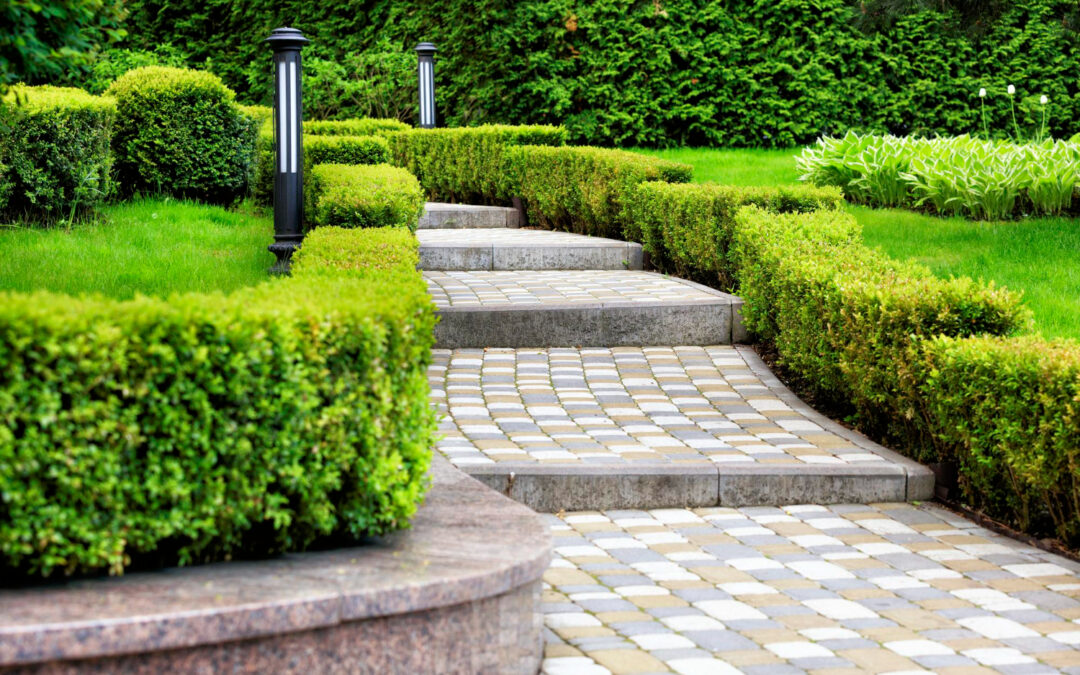Hardscaping plays a vital role in the design and functionality of commercial landscapes. With our help, businesses can transform outdoor spaces into practical and inviting areas for clients and employees. Walkways, patios, and seating areas enhance usability, turning plain lawns into multifunctional spaces that attract and welcome visitors. By incorporating hardscaping elements, commercial properties become more accessible and enjoyable for everyone.
In addition to improving use, hardscaping significantly boosts curb appeal and property value. Creative designs using materials like stone, brick, or concrete add visual interest and sophistication to any setting. These enhancements create a positive first impression and can set a business apart from neighboring properties. Moreover, the durability and low maintenance needs of hardscaping materials offer long-term cost savings, making them a smart investment for commercial landscape projects.
Environmental considerations are also crucial. Hardscaping options such as permeable pavers help with water management and reduce erosion, promoting sustainability. By choosing eco-friendly materials and practices, businesses can create beautiful landscapes that support environmental health. In this article, we’ll explore how hardscaping can transform commercial spaces, providing detailed tips and benefits that ensure your property looks its best in 2024 and beyond.
Increased Functionality and Usability in Commercial Spaces
Hardscaping features like walkways, patios, and seating areas play a crucial role in enhancing the functionality and usability of commercial properties. Walkways guide foot traffic efficiently, reducing the wear and tear on landscaped areas and preventing soil compaction. They also provide safe, navigable paths for clients, employees, and visitors. Patios offer outdoor spaces for meetings, breaks, and social gatherings, creating a pleasant environment that can boost productivity and well-being.
Seating areas, whether simple benches or more elaborate arrangements, invite people to relax and enjoy the outdoor spaces. These areas can be strategically placed to capitalize on views or provide a serene escape amidst a bustling commercial setting. When designed thoughtfully, hardscaping elements integrate seamlessly with the natural landscape, ensuring a cohesive and inviting environment for everyone who visits or works at the property.
Improved Aesthetics and Property Value
Hardscaping significantly enhances the visual appeal of commercial landscapes by providing structure and contrast with plantings. Elements like stone pathways, retaining walls, and water features add texture and visual interest, making a property more attractive. A well-designed hardscape can turn an ordinary space into a memorable one, leaving a lasting impression on clients and visitors.
The design of hardscaping also impacts property value and curb appeal. Properties with well-maintained and aesthetically pleasing landscapes are perceived as more valuable and professional. Features like decorative pavers, artistic stone arrangements, and modern water features can elevate the overall look of a commercial space, making it more appealing to both clients and potential buyers. Creative ideas like terraced gardens, sculptural elements, and themed areas can transform a bland landscape into a remarkable, eye-catching space, supporting the business’s brand and mission.
Durability and Low Maintenance Benefits
Hardscaping materials like concrete, stone, and brick are known for their durability. Unlike plants and lawns, which require regular watering, mowing, and care, hardscaping elements can withstand harsh weather conditions and heavy foot traffic with minimal upkeep. This resilience makes them an excellent choice for commercial properties that experience high use and need long-lasting solutions.
The long-term cost savings from using durable hardscaping materials are significant. Businesses spend less on maintenance and repairs, freeing up resources for other essential functions. By choosing low-maintenance materials such as permeable pavers or treated wood, property owners can further reduce upkeep efforts. Opting for materials that require occasional cleaning and sealing can ensure the hardscape remains in excellent condition for years. Hardscaping reduces the overall time and effort needed to maintain a pristine commercial landscape, making it a practical choice.
Environmental and Sustainability Advantages
Permeable pavers and other eco-friendly hardscaping options offer numerous environmental benefits. Permeable pavers, for example, allow rainwater to seep through the surface, reducing runoff and promoting groundwater recharge. This feature helps businesses manage stormwater and prevents flooding, which can lead to soil erosion and other issues.
Sustainable hardscaping practices also play a role in water management and conservation. By incorporating elements such as rain gardens or swales, businesses can direct rainwater to areas that need it most. These techniques help reduce the need for additional irrigation and make the landscape more sustainable. Moreover, hardscaping solutions like retaining walls and terraces can stabilize slopes and prevent soil erosion, contributing to the overall health of the environment.
Using recycled materials for hardscaping is another way to enhance sustainability. Choosing products made from reclaimed wood, recycled concrete, or other eco-friendly materials reduces the environmental impact and supports green initiatives. These practices demonstrate a commitment to sustainability and help businesses meet their environmental goals while maintaining an attractive and functional landscape.
Conclusion
Incorporating hardscaping into commercial landscape designs offers numerous benefits that can transform a property. Hardscaping elements make commercial spaces more appealing and practical, from increased functionality and usability to improved aesthetics and property value. Durable materials and low-maintenance solutions ensure long-term cost savings, while eco-friendly options provide significant environmental advantages.
A well-designed hardscape creates a welcoming environment that enhances the overall experience for clients, employees, and visitors. By integrating features like walkways, patios, and seating areas, businesses can maximize their outdoor spaces and improve customer satisfaction. Sustainable practices such as permeable pavers and recycled materials further contribute to environmental conservation and responsible water management.
Trust the professionals at Cardinal Landscaping to incorporate beautiful and functional Raleigh hardscaping elements into your commercial landscape design, ensuring your property stands out in 2024 and beyond.

